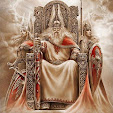The city of Athens or Athina, during the classical period of ancient Greece (480-323 BC), was the major urban centre of the notable polis (city-state) of the same name, located in Attica, Greece, leading the Delian League in the Peloponnesian War against Sparta and the Peloponnesian League. Athenian democracy was established in 508 BC under Cleisthenes following the tyranny of Isagoras.
This system remained remarkably stable, and with a few brief interruptions remained in place for 180 years, until 322 BC (aftermath of Lamian War). The peak of Athenian hegemony was achieved in the 440s to 430s BC, known as the Age of Pericles. In the classical period, Athens was a centre for the arts, learning and philosophy, home of Plato's Academy and Aristotle's Lyceum, Athens was also the birthplace of Socrates, Plato, Pericles, Aristophanes, Sophocles, and many other prominent philosophers, writers and politicians of the ancient world.
It is widely referred to as the cradle of Western Civilization, and the birthplace of democracy, largely due to the impact of its cultural and political achievements during the 5th and 4th centuries BC on the rest of the then-known European continent. Hippias, son of Peisistratus, had ruled Athens jointly with his brother, Hipparchus, from the death of Peisistratus in about 527.
Following the assassination of Hipparchus in about 514, Hippias took on sole rule, and in response to the loss of his brother, became a worse leader who was increasingly disliked. Hippias exiled 700 of the Athenian noble families, amongst them Cleisthenes' family, the Alchmaeonids. Upon their exile, they went to Delphi, and Herodotus says they bribed the Pythia always to tell visiting Spartans that they should invade Attica and overthrow Hippias.
That supposedly worked after a number of times, and Cleomenes led a Spartan force to overthrow Hippias, which succeded, adn instated an oligarchy. Cleisthenes disliked the Spartan rule, along with many other Athenians, and so made his own bid for power. The result was democracy in Athens, but considering Cleisthenes' motivation for using the people to gain power, as without their support, he would have been defeated, and so Athenian democracy may be tainted by the fact its creation served greatly the man who created it.
The reforms of Cleisthenes replaced the traditional four Ionic "tribes" (phyle) with ten new ones, named after legendary heroes of Greece and having no class basis, which acted as electorates. Each tribe was in turn divided into three trittyes (one from the coast; one from the city and one from the inland divisions), while each trittys had one or more demes, depending on their population, which became the basis of local government.
The tribes each selected fifty members by lot for the Boule, the council that governed Athens on a day-to-day basis. The public opinion of voters could be influenced by the political satires written by the comic poets and performed in the city theaters. The Assembly of Ecclesia was open to all full citizens and was both a legislature and a supreme court, except in murder cases and religious matters, which became the only remaining functions of the Aeropagus.
Most offices were filled by lot, although the ten strategoi (generals) were elected. The silver mines of Laurion contributed significantly to the development of Athens in the 5th century BC, when the Athenians learned to prospect, treat, and refine the ore and used the proceeds to build a massive fleet, at the instigation of Themistocles. In 499 BC, Athens sent troops to aid the Ionian Greeks of Asia Minor, who were rebelling against the Persian Empire.









